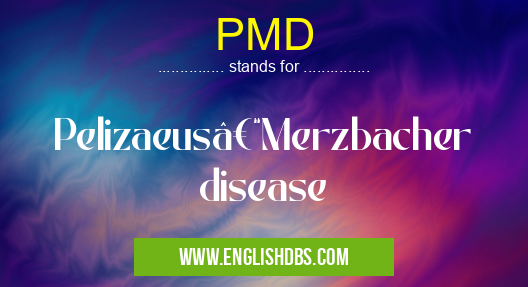What does PMD mean in REHABILITATION
PMD stands for Pelizaeus-Merzbacher Disease, a rare genetic disorder that affects the central nervous system, particularly the brain and spinal cord. It is caused by mutations in genes responsible for producing myelin, a fatty substance that insulates nerve fibers and allows for the efficient transmission of electrical signals.

PMD meaning in Rehabilitation in Medical
PMD mostly used in an acronym Rehabilitation in Category Medical that means Pelizaeus–Merzbacher disease
Shorthand: PMD,
Full Form: Pelizaeus–Merzbacher disease
For more information of "Pelizaeus–Merzbacher disease", see the section below.
Symptoms
Symptoms of PMD vary depending on the severity of the disorder and can include:
- Motor problems: Difficulty walking, muscle weakness, poor coordination, tremors
- Intellectual disability: Ranging from mild to severe
- Speech difficulties: Slow, slurred speech
- Eye problems: Nystagmus (involuntary eye movements), poor vision
- Cognitive impairments: Difficulty with attention, memory, and problem-solving
Diagnosis
PMD is diagnosed based on clinical symptoms, family history, and genetic testing. Magnetic resonance imaging (MRI) scans can show abnormalities in the brain and spinal cord, supporting the diagnosis.
Types
There are four main types of PMD:
- Classic PMD: The most severe form, characterized by early onset and rapidly progressive symptoms.
- Connatal PMD: Presents at birth with severe symptoms, including seizures and breathing difficulties.
- Intermediate PMD: Onset occurs later than classic PMD, with symptoms ranging from mild to moderate.
- Adult-onset PMD: A rare form that develops in adulthood, with symptoms typically milder than other types.
Causes
PMD is caused by mutations in genes involved in myelin production. These genes include:
- PLP1: Produces proteolipid protein 1, a major component of myelin
- GJC2: Encodes connexin 26, a protein that forms gap junctions between myelin-producing cells
- MAG: Myelin-associated glycoprotein
Treatment
There is currently no cure for PMD. Treatment focuses on managing symptoms and improving quality of life. Therapies include:
- Supportive therapies: Physical therapy, occupational therapy, and speech therapy
- Medications: Anticonvulsants for seizures, muscle relaxants for spasticity
- Stem cell therapy: Experimental treatments that may help restore myelin production
Essential Questions and Answers on Pelizaeus–Merzbacher disease in "MEDICAL»REHABILITATION"
What is Pelizaeus-Merzbacher disease (PMD)?
Pelizaeus-Merzbacher disease (PMD) is a rare genetic disorder that affects the central nervous system, primarily the brain and spinal cord. It is characterized by a deficiency or absence of myelin, a protective substance that surrounds nerve cells and helps facilitate the transmission of nerve impulses.
What are the symptoms of PMD?
Symptoms of PMD vary depending on the severity of the condition, but may include:
- Nystagmus (involuntary eye movements)
- Tremors
- Weakness and stiffness in the muscles
- Speech difficulties
- Intellectual disability
- Seizures
What causes PMD?
PMD is caused by mutations in genes involved in the production of myelin. The most common mutation is in the PLP1 gene, which codes for the proteolipid protein 1, a major component of myelin.
How is PMD diagnosed?
PMD is diagnosed through a combination of physical examination, medical history, and genetic testing. A nerve conduction study may also be used to assess the function of the nerves.
What is the treatment for PMD?
There is no cure for PMD, but treatment can help manage symptoms and improve quality of life. Treatment may include:
- Medications to relieve tremors, seizures, and other symptoms
- Physical and occupational therapy to improve mobility and coordination
- Speech therapy to improve communication
Final Words: PMD is a rare but serious disorder that affects the central nervous system. Symptoms and severity vary depending on the type of PMD and the underlying genetic mutation. Early diagnosis and appropriate management are essential for improving outcomes and quality of life for individuals with PMD. Ongoing research is focused on developing new treatments and therapies to address this challenging condition.
PMD also stands for: |
|
| All stands for PMD |
